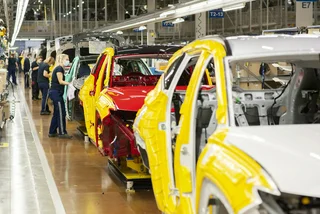Industrial production in May 2023 saw a modest increase in real terms, with a year-on-year growth of 1.4 percent. In a month-on-month comparison with April, it rose by 1.6 percent, according to the Czech Statistical Office (ČSÚ). Economist Lukáš Kovanda said the results were better than expected.
The growth in industrial production was primarily driven by the manufacturing of cars and other motor vehicles. Kovanda said that the Czech auto industry benefited from the improvement in the situation in international logistics.
“Broken supply-customer chains are being consolidated, which allows domestic car companies to start production at higher speeds and satisfy the deferred demand, accumulated since the time of Covid and its fading,” he said in a blog post.
“May car production in the Czech Republic was the second-strongest since the beginning of 2020, when the Covid crisis began. For the whole of this year, the industry as a whole should end up in the black. Compared to last year it is expected to improve by 1.9 percent,” he added.
Improved auto production was a big benefit to foreign trade, which ended up with a surplus of CZK 11.8 billion in May, which was also slightly better than expected. Year-on-year, this is an almost CZK 40 billion increase, Kovanda said. Last year, Czech foreign trade was adversely affected by rising energy prices that were affected by international events.
“With the dramatic drop in energy prices that has occurred since then, the cost of relevant imports to the Czech Republic, whether it is oil, oil products or gas, is also falling,” Kovanda said.
Czechia is also a large exporter of electricity to the rest of Europe, so its foreign trade is adversely affected by falling energy prices.
“Nevertheless, this year Czech foreign trade will show a significantly better result than last year. While last year it posted a deficit of around CZK 200 billion, this year it should end slightly ‘in the plus,’ at the level of the so-called ‘black zero,’ more specifically in a surplus of around CZK 5 billion to CZK 10 billion,” Kovanda said.
Not all sectors were as successful
While the auto industry, which drives the Czech economy, did well, most economic activities within the Czech industry reported a decline. Mining and quarrying, in particular, experienced a significant decrease of one-fifth compared to May 2022, mainly due to lower brown coal mining. Manufacturing of other non-metallic mineral products, the chemical industry, and basic metals also recorded double-digit declines.
The value of new orders in surveyed industrial activities decreased by 4.4 percent in May 2023, compared to the previous year. Non-domestic new orders decreased by 4.7 percent compared to last year, while domestic new orders dropped by 3.9 percent. The decline was primarily influenced by double-digit decreases in new orders in the manufacturing of basic metals and the chemical industry, according to the ČSÚ.
The average registered number of employees in the industry decreased by 1.7 percent in May compared to the previous year. However, the average gross monthly nominal wage of these employees increased by 11.1 percent compared to the same period last year.












 Reading time: 2 minutes
Reading time: 2 minutes 
























